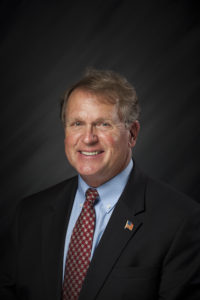State Rep. Bob Heaton and State Senator Jon Ford
Frank Phillips / DLC Media News
BRAZIL – Education is expected to take a smaller bite out of the Indiana budget for the next two years.
“This is the first time since I was elected the school budget will be less than half of the state budget,” said State Senator Jon Ford.

Education’s bite out of the whole state budget will be 48 percent, if the Senate budget of $43 billion is adopted.
Ford and State Representative Bob Heaton spoke in a crackerbarrel session at the Clay County Chamber of Commerce office in Brazil on Saturday morning. Normally, the crackerbarrel would have been held in Cory but was moved due to a scheduling conflict at the Cory Firehouse, said Marshall Nuckolls of Indiana Farm Bureau (Clay County), co-sponsor with the Chamber of Commerce.
So far, there are three budgets being considered in Indiana: The Governor’s Budget, the Senate budget and the House budget.
The main education areas covered in the Senate version of the budget include 10 percent more for Special Education, English Learning classes and paying down the teachers’ pension debt. Money was borrowed from that fund and needs to be repaid, Ford said.
Economic development was another part of the Senate budget Ford addressed.
If passed, there will be an economic development grant available to help busineses recruit new employees, a program to to promote regional development.
Cutting debt is a concern of the Senate, Ford said. For example, a new inn at Potato Creek State Park in St. Joseph County will be paid for with cash.
The House budget would give more to local school boards and mandate less by the state, Heaton said.

There is a concern in the House about Senate Bill 4 because often money is put into a program “that never goes away,” resulting in future commitment to those programs with little desire to lower or end that financial commitment.
Another issue was House Bill 1608, a controversial measure that would make it illegal for children in grades K through 3 to be taught about gender identity. Heaton said he has a granddaughter who will enter Staunton Elementary School and that makes this a personal priority for him.
“I’m 99 percent sure she won’t be taught gender identity in school but this bill would make it 100 percent sure,” Heaton said.
Gender identity “should not be taught in schools,” commented Gary Rickert, a local candidate.
In discussion prompted by the handful of residents in attendance:
Senate Bill 4, a measure that some worry would limit the autonomy of local health departments, has been changed to make it optional for counties to enter the program, Ford said.
A digest of Senate Bill 4 can be found here: https://iga.in.gov/legislative/2023/bills/senate/4
Cheryl Schopmeyer, a member of the Clay Community Schools Board of Education, expressed concern that SB4 could eventually become mandatory, if adopted.
She expressed concern about state and federal government becoming too involved in local issues.
Ford said the Senate is is trying to push issues back to local school boards.
For example, bills that would force school board candidates to label themselves Republican or Democrat on the ballot failed.
“Local people know local people,” Heaton said, indicating that such party labels are not required.
Concerning state involvement in local educational issues, Heaton said, “Sometimes local school boards don’t want to deal with the things we deal with,” but the General Assembly wants local schools to have more freedom and Ford agreed.
The recently adopted Clay Community Schools Police Force funding was brought up by Rickert.
“Where will funding for the schools police force come from?” he asked.
Ford replied there is money at the state level for school security, but “I don’t think there is enough for police departments. I’m not in favor of it.”
When Rickert said there is not enough transparency in administration of schools in Clay County, Ford said that is a common situation.
“Right now in education in Indiana there are a lot of things that happen in back rooms,” Ford said.
The solution is for more parents to get involved in their children’s education, to which Schopmeyer agreed.
“I think education in Indiana will continue to change and become different,” Heaton said. “We need more taxpayers in the state.”
Concerning healthcare costs, “We hav some of the highest healthcare costs in the country.”
One of the things the General Assembly is doing is to get hospitals and other large medical providers to lower costs.
There is also a bill being considered that would eliminate con-competition caluses forced on doctors by hospitals.
The controversial SB4 is trying to reign in costs, Ford said, even though he doesn’t like government interfering with employers and employees.
One reason healthcare costs are high is because the State of Indiana believes there are a million people on Medicaid in the state that shouldn’t be, Ford said.
A final issue brought up at the meeting by the audience was the Indiana Department of Environmental Management, which Rickert likened to the Gestapo.
“They have a lot of regulations that are hard to deal with,” agreed Nuckolls before the meeting dismissed.
It is unlikely there will be another crackerbarrel in Clay County during this session of the General Assembly due to a desire of the House and Senate members to wrap up the session on April 29, which is, technically, the scheduled date to finish, Heaton said.


